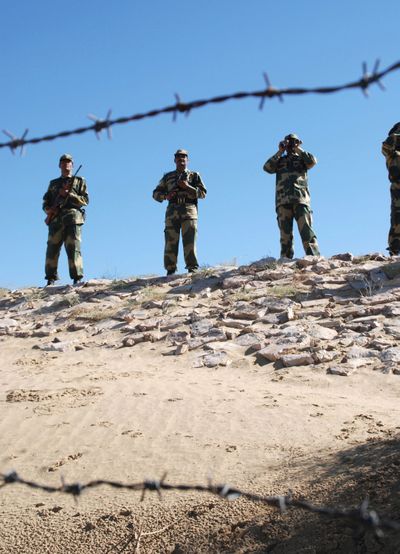India, Pakistan saber rattling raises war fear

ISLAMABAD, Pakistan – Pakistan is moving some troops away from its border with Afghanistan, Pakistani officials said on Friday, sparking renewed fears that last month’s terrorist attack in Mumbai, India, could trigger a fourth war between the two countries, both of which are now armed with nuclear weapons.
Media reports in both countries, most unconfirmed and some false or exaggerated, have fueled rising war hysteria in India and Pakistan, and U.S. officials and independent analysts worry that any signs of preparation for war could trigger a conflict that neither country wants and that neither can afford.
The Bush administration has been trying to calm the situation, but U.S. officials worry that Pakistan’s weak civilian government can’t meet India’s demands for a crackdown on Islamic militant groups without sparking a backlash from the country’s powerful army and the directorate of Inter-Services Intelligence, which have ties to some militant groups.
“We hope that both sides will avoid taking steps that will unnecessarily raise tensions during these already tense times,” said U.S. National Security Council spokesman Gordon Johndroe.
Stephen Cohen, a South Asia expert with the Washington-based, center-left policy research organization the Brookings Institution who returned on Monday from a visit to India, said the coalition government of Prime Minister Manmohan Singh doesn’t want a confrontation, but is under considerable public pressure to retaliate against Pakistan for the Mumbai attacks.
“There is nothing (the Singh government) can do except make threatening noises toward Pakistan,” he said. “Both countries are rattling their sabers. These are two weak governments that are clearly trying to get the Americans nervous so they put pressure on the other country (to back down).”
He called the current atmosphere “a precursor to a crisis” that could erupt because of the high possibility of a misstep on either side.
“We are in a period of touch-and-go,” he said.
For U.S. and NATO troops battling the Taliban and al-Qaida, however, any Pakistani withdrawal from the frontier with Afghanistan could be disastrous. Pakistan has some 100,000 troops stationed along the Afghan border, and their departure would give the Taliban and other groups refuge and free rein in an area that sits astride America’s supply lines into Afghanistan.
It wasn’t clear Friday, however, how extensive the Pakistani move away from the Afghan border is.
A Pakistani defense official, who couldn’t be named because of the sensitivity of the issue, said, “Troops, in snowbound areas and places where operational commitments were less (in the west), have been pulled back.”
The official, however, denied reports that the soldiers had been redeployed to the Indian border, and he declined to say how many troops were involved. Media reports, quoting witnesses, spoke of long convoys of trucks carrying troops, passing through towns in western Pakistan, traveling eastward, but another security official, who lacked the authorization to speak and couldn’t be named, said that there’d been “no untoward troop movement.”
The objective and magnitude of the Pakistani troop movements are unclear, said a U.S. official, who requested anonymity because he wasn’t authorized to speak publicly.
He said, however, that Pakistan usually pulls troops out of mountainous northwestern areas bordering Afghanistan during the winter, when operations against militants allied with al-Qaida usually wind down.
Indian Prime Minister Singh met with his military chiefs on Friday, and there also have been unconfirmed reports in recent days that India has moved troops to Rajasthan, a region that borders Pakistan. Pakistan fears that India might launch an invasion from Rajasthan into Sindh province, aiming to sever the northern and southern halves of Pakistan.
Hasan Askari Rizvi, a military expert based in the eastern Pakistani city of Lahore, said that India might be calculating that a move into Sindh wouldn’t trigger a nuclear response from Pakistan, unlike an invasion of Punjab province, the country’s heartland.
“Pakistan and India are at some distance from war, but when troops start moving, any misperception, or any miscalculation, can be dangerous,” Rizvi said.
Pakistan has canceled leave for all its soldiers, and India has told its citizens not to travel to Pakistan. Since the Mumbai attacks, there have been at least four air incursions into Pakistan by Indian fighter jets. Pakistani officials publicly acknowledged two cross-border flights, but dismissed them as inadvertent.